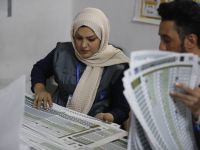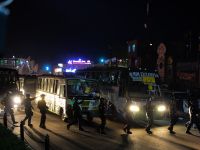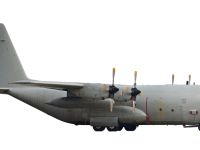On the peak of a hill poking through a bank of freezing fog, hundreds of Kosovo Albanians pressed up against the doors of a rundown country school at the first light of dawn to vote.
To reach the polling station the voters of Stimlje, 30 miles (50 kilometers), south of Pristina had to stumble 500 meters (yards) up a steep muddy hill overlooking their town and queue in the chill shade of the building.
But as the low, bright autumn sun cut the through the fog it revealed a huge mass of voters determined not to miss their chance to take part in the first election in Kosovo since the province was taken under the wing of the international community.
Wheezing, and coughing, shivering under a heavy woolen headscarf, 70-year-old Azemine Rizane, was glad to reach the summit and collapse into a chair while her husband joined the good-humored crowd massing in front of the school.
"I'm very sick, so the police let me come half way up in a car, but it still took me half and hour," she said, "I'm very ill."
NATO observers and election officials from the Organization for Security and Co-operation in Europe (OSCE) are overseeing the vote.
They told AFP how former guerillas backing the Democratic Party of Kosovo (PDK) had waged a fierce campaign of intimidation against the moderate Democratic League of Kosovo (LDK) in Stimlje and the neighboring municipality of Lipljan.
But that did not appear to have stopped people turning out early on the bitterly cold morning to play their part in what they see as their province's next step on the road to full statehood.
But if they thought their difficulties were over once they had finally squeezed their way into the school to vote, they were to be disappointed.
Each of the 6,900 voters registered to vote in the Stimlje school's six polling stations, faces lengthy and often frustrating checks before they can actually vote.
First, the voter has to present photographic proof of identity, their name has to appear on the hastily assembled voter list and they have to present a slip proving they have registered.
Those who have the slip, but do not appear on the list, can make a conditional vote which is processed separately to check its validity.
Without proof of identity however, voting is impossible, even though Kosovo's post-war UN administration has not yet been able to issue identity documents.
One man who arrived with voting slips for himself and his wife, but only his own ID card, stormed off in disgust when told his wife could not vote.
"Our house was burned in the war, what can we do?" he demanded, before throwing the slips back at officials.
In other cases local election staff were slow to process the votes because of confusion over the system, officials admitted.
"I don't think the local staff have had enough training," said OSCE overseer Krystyna Galezia, "I'm a local government consultant in Poland, but even for me this is a difficult test."
In one of the polling stations in the school only 48 people voted in the first three hours, while hundreds more waited outside.
But Michael Schrepping, manager of the Stimlje voting center, said the process should speed up in the course of the day as officials began to get used to the system.
"Everyone who get's here before 7:00 p.m. will be able to vote," he promised -- LIPLJAN (AFP)
© 2000 Al Bawaba (www.albawaba.com)







